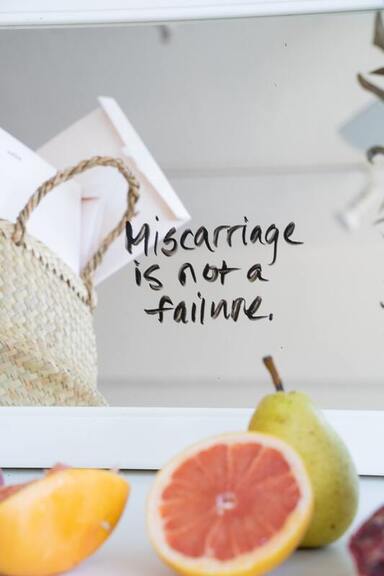|
By: Nick Carrington EPLA Editor In a recent interview with Today and an Instagram post, Jinger (Dugger) Vuolo, of “19 Kids and Counting” fame, communicated so much of what we believe at the Early Pregnancy Loss Association. She describes the excitement of telling her family about her baby and the devastating reality of losing that life. She equates the pain of losing her child with the loss of her grandmother, suggesting that both are the death of a precious person. Jinger reflects on the joy of her current pregnancy but admits the pain of her miscarriage has not left her: healing takes a long time. Her words are both painful and cathartic: "Within moments I knew that I’d lost the baby. Tears filled my eyes, sadness cloaked my soul. Having just lost my grandmother months before, the news of new life was like spring lilies blossoming after a dark, cold winter. And in a moment, that life was gone. I know many of you can relate. The minutes feel like hours, the hours like days, don’t they? I was helpless—nothing I could do would restore the lost life. Yet, I was never hopeless." Jinger has relied on her faith for peace. The EPLA recognizes the complex emotions that come with miscarriage and subsequent pregnancies, and we stand to provide as much support as possible for grieving families. We encourage you to read the interview and Jinger’s Instagram post. Nick Carrington is an Editor for the EPLA and Assistant Professor of Professional Writing at Cedarville University.
0 Comments
By: Maria Servold EPLA Editor In a recent YouTube video, creator “Nurse Zabe,” (Elizabeth) who posts informational videos about pregnancy, birth, and babies, shared her own story of a chemical pregnancy she lost. As a labor, delivery, and postpartum nurse, as well as a certified childbirth educator, her videos are both informative and humorous. This video, while still incredibly informative, is also a sad testament to the commonality of “chemical” pregnancies. As she describes it, A chemical pregnancy is when a woman finds out she’s pregnant with a pregnancy test before her missed period (in other words, very early), and then has a miscarriage. In many other cases, a woman may not know she is pregnant and the miscarriage could appear like a normal period; the woman would be none the wiser. Many in our society would brush off such a pregnancy, citing the extremely early nature of the loss. But any woman who has hoped to become pregnant and has seen a positive result on a home pregnancy test knows an extremely early loss is just as painful as a later one. The video is both informative and moving. Not only does she explain what a chemical pregnancy is and how often they occur (an estimated 75% of miscarriages are chemical pregnancies, she says), she spends the first half of the video talking about how she felt during her experience: the joy at seeing a positive test, the worry when she experienced cramping and spotting, and the devastation when a blood test revealed she was not viably pregnant. Elizabeth notes, “If I hadn’t taken that test, I wouldn’t have known.” This is the feeling many women get caught up in with chemical pregnancies or other early losses. They may debate themselves endlessly: Should I have waited to test? Was I too eager? She also reassures her viewers: “It’s OK to mourn the loss of the dream [of that child].” Videos like this are so helpful to expand education about early pregnancy loss. We applaud Nurse Zabe for sharing her story, and we mourn the loss of her unborn baby. The video is here. Maria Servold is an Editor at the EPLA, Assistant Director of the Herbert H. Dow II Program in American Journalism, and Lecturer in Journalism at Hillsdale College.
By: Nick Carrington EPLA Editor On a recent podcast, author and blogger Jasmine Holmes talked about how a miscarriage early in her marriage created a temper and feelings of anger that she hadn’t experienced before. She was already adjusting to life with her spouse and had moved away from her lifelong home; the trauma of losing a child only compounded the stress. She described how her grief brought out things that had been suppressed within her. We should not be surprised. Miscarriage is the death of a loved one, a precious child that parents have longed for and loved. It does not merely disappoint. It stings the soul. A troubled soul can stir up emotions that have remained dormant for years, and as Holmes explains, those emotions may bewilder loved ones. But as loved ones, we have an opportunity to walk alongside the grieving as they battle the demons that are exposed through grief. We should expect that their demeanor will be different, that their personality will change for a while. Parents who have lost a child may not be themselves in many ways. And as we see these effects, we will have many opportunities to extend grace to them. Grace for the anger that bubbles out. Grace for the cancelled plans and long nights. Grace for the texts that never get answered. Grace for the pain they may cause through careless words. It won’t always be easy, but grace is a part of helping loss parents heal. Through grace, hearts are softened, minds are comforted, and souls gain rest even for just a moment. So as we seek to form a community around those grieving a miscarriage, may grace be the norm. Nick Carrington is an Editor for the EPLA and Assistant Professor of Professional Writing at Cedarville University.
|
Archives
December 2023
Categories
All
|




 RSS Feed
RSS Feed